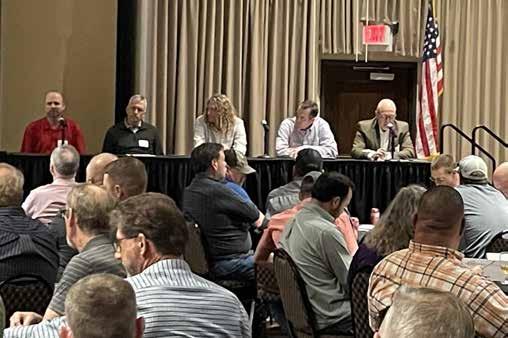
3 minute read
Highway fund protected, new dollars for local infrastructure
The transportation industry emerged from the 2023 legislative session with several wins, including protecting highway fund dollars and securing $215 million in new dollars for local infrastructure projects. KCA was also able to mitigate issues that would have created new requirements for contractors, including a change that would have impacted unemployment benefits for workers in our industry.
Taxes
Advertisement
The most notable veto that failed to get the votes for an override this session was Senate Bill 169, the mega tax bill. The bill would have moved the state to a flat income tax rate of 5.15%, accelerated the elimination of the state portion of food sales tax, increased property tax exemptions for homeowners, and smoothed the social security income tax cliff. The bill was expected to have the votes to override, but fell short in the Senate with two conservatives voting against the override and one conservative passing. With little time left in the session, a second tax bill was not attempted, leaving further tax cut discussions for next session.
BUDGET, HIGHWAY FUND & NEW LOCAL INFRASTRUCTURE FUND
The original budget, House Bill 2184, passed by the Legislature before First Adjournment, largely protected State Highway Funds from transfers. One such attempt to transfer dollars from the Highway Fund would have diverted $10 million from the Highway Fund to modernize the state’s license plate system. In budget negotiations, the Legislature removed the transfer and instead designated federal funds for this project.
The Governor line-item vetoed a provision in HB 2184 to create the BUILD Kansas Matching Grant Fund and earmark new dollars from the General Fund for local infrastructure projects. However, the Legislature revived the concept in its Omnibus budget, Senate Bill 25. Specifically, SB 25 creates the Matching Grant Fund and designates $215 million to help draw down federal funds for local projects as part of the Infrastructure Investment and Jobs Act.
Employment Bills
E-Verify. During the Regular Session, Sen. Caryn Tyson (R-Parker), chair of the Senate Tax committee, amended an e-verify provision onto the budget bill, House Bill 2184, during floor debate. That provision would have require “all state agencies and contractors with the state to enroll and actively participate in e-verify for verification of employment eligibility in Fiscal Year 2024 and Fiscal Year 2025.” The language in the provision contained a number of inconsistencies, including conflicting information on how subcontractors were to be handled. Due to the inconsistencies, budget negotiators inserted language into the Omnibus budget (Senate Bill 25) that delays implementation until Fiscal Year 2025. We will continue to work with KDOT on implementation.
Unemployment for Temporary Employees. House Bill 2401 would have amended the state’s unemployment laws, including defining temporary unemployment as “an individual who has been laid off due to lack of work by an employing unit for which the individual has worked full time and reasonably expects to resume full-time work at a future date and the individual’s employment with the employing unit has been temporarily suspended and not terminated.” The bill also would have changed the number of weeks a temporary employee could receive benefits, generally limiting them to eight consecutive weeks. However, extensions of up to four additional weeks could be permitted upon approval of the Secretary of Labor.
Extensions would be allowed only upon a determination by the Secretary that the employer has filed all required employment security reports, paid all required contributions and is either a positive account employer or a negative account employer with a calculated reserve ratio that has improved since the employer’s most recent reporting year. HB 2401 passed the House but was not heard by the Senate Commerce Committee. The bill will remain alive for next session. We will be working with Leadership and Commerce committee members during the interim on potential solutions to address concerns without impacting workforce availability in industries, like transportation, that have seasonal considerations.
Tax Credit for Apprenticeships. House Bill 2292 was signed into law. The bill creates a tax credit for certain employers who create apprenticeship programs to strengthen and expand the Kansas workforce. Employers would be eligible for the tax credit for up to 20 apprentices in tax years 2023, 2024 and 2025.

Transportation Bills
Water Infrastructure Projects. House Bill 2302 passed the Legislature and was approved by the Governor. It includes creation of the Water Project Grant Fund and directs a portion of revenue from the state sales tax to fund water-related infrastructure projects.
Railroad Track Maintenance Funding. House Bill 2335 increases the transfer from the State Highway Fund from $5 million to $10 million for the rail service improvement fund. This will create loans and grants for qualified track maintenance in the rail service improvement program.









